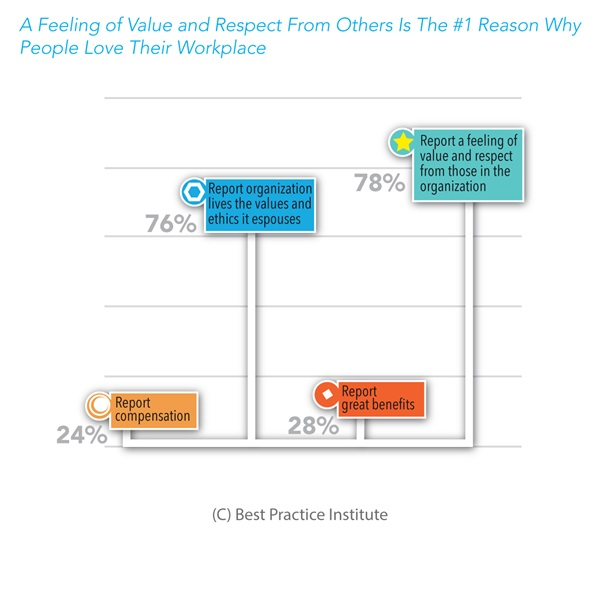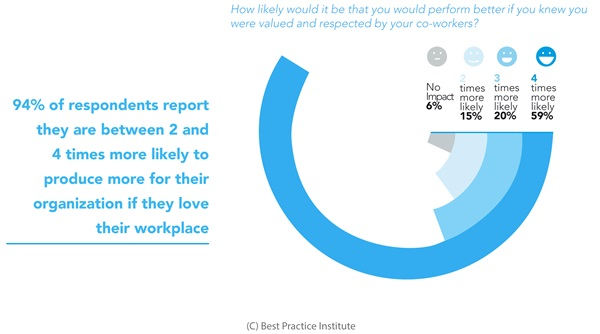ATD Blog
5 Factors That Lead to More Productive Employees
Thu Mar 23 2017




**
Workforce Developments and Employee Expectations
**
In America, the rise of the contingent workforce and independent contributors continue to increase. According to the U.S. Government Accountability Office, the size of the contingent workforce ranges from less than 5 percent to more than a third of the employed labor force. Millennials in particular don’t necessarily want to spend time within a company’s walls anymore. One study published in the Journal of Business and Psychology cites multiple sources stating that Millennials desire more flexible working conditions and hours, including working from remote locations. And to top it all off, the U.S. Bureau of Labor Statistics says we are dealing with a historically low rate of labor productivity growth.
Who or what do we have to blame for this? Is technology at fault for all of this "hiding" from people and our workplaces? Or is it something deeper? Perhaps something more human?
Maybe we have to go back to basics and take a look at Maslow’s hierarchy of needs. The hierarchy postulates five different levels of belonging that are critical to human survival: physiological needs, safety needs, belongingness and love needs, esteem needs, and self-actualization. Some of these needs are being debunked in the workforce; we no longer need work to fulfill our belongingness and love needs. However, psychological safety and esteem seem to be linked strongly to a sense of accomplishment at work. Our results from a survey that spanned more than 175 companies across the United States, Middle East and Northern Africa, and Southeast Asia show that esteem and safety factors in the form of respect and the company living the values it espouses is critical to self-actualization. In fact, the feeling of value and respect from others is the number one reason why people love their workplace.
It used to be that companies valued friendship as one of the main attractors for employees. But people no longer need friends at work, apparently. Our studies show that friendship comes up as one of the least likely desires at work, alongside perks, benefits, and compensation. Do we no longer require the same level of human connection or financial stability as we did when Maslow created his hierarchy of needs in 1943? Has our economy and indeed the human condition changed? Maybe not. Maybe we have advanced to a point where it’s nice to have friends at work, but to love a workplace we need to feel truly valued and respected—something that goes beyond working with nice people.
**
A Most Loved Workplace Leads to More Productive Employees
**
And why should you care if your employees love working at your company? Simple: 94 percent of our respondents report that they are between two and four times more likely to produce more for their organization if they love their workplace.
We already know that employees want to be valued and respected. But there is more. In a large-scale qualitative study, we asked employee what the term most-loved workplace means to them. Also taking into account the quantitative results of our survey, in which respondents ranked specific company and work environment traits, we have come up with five factors that make employees love their workplace. If you can manage to increase your employees’ perception of how your company ranks on these five factors, you could soon be on your way to reap the benefits of more productive employees.
**
Creating a Most Loved Workplace: The Five Factors That Matter
People
**
Employees value teamwork and collaboration and want to work in a workplace that supports their need to collaborate with one another. Employees say that co-workers should be expected to assist one another when issues arise and that problems should be solved together. Another important consideration is communication among the people who work at the company. Employees want open communication channels in which information is shared freely, employees can learn from one another, and feedback is given in a constructive, positive manner.
### Ethics
Employees want to work at a place that emphasizes honesty, integrity, and ethics. Employees want to work for a company that lives the values it espouses. Sincerity is an important concept valued by employees. So, it is not enough for a company to say that ethical behavior is valued. The company has to show in daily business dealings that ethical behavior is expected, supported, and lived in its dealings with all shareholders. All co-workers should be respectful of one another’s opinions. Diversity should be appreciated. Employees also want to work with co-workers and bosses who are reliable and held accountable for their actions.
### Respect and Appreciation
Employees want to be appreciated and recognized for achievements at their workplace. They want to work in an environment where they feel respected, trusted, and heard. Differing opinions should be met with respect and contributions to a team project should be valued. There should be no undermining one another for credit within the company. Instead credit should be given to all team members. The general expectation is that a workplace should be fair and supportive.
### Positive Future
Employees want to work in a positive environment that fosters innovation and openness along with a general positive attitude toward the future. Innovative, out-of-the-box thinking should be supported. There should be an overall environment that strives for improvement along with an openness to learn from one another for the better of the company.
**
Achievement
**
Employees want to work at a place where effort and hard work are valued, processes are in place, and they can focus on the customer and work toward shared goals. Employees want their co-workers and bosses to be willing to work hard for their customers and for the common good of the company.
**
Where Do We Go from Here?
**
People don’t seem to enjoy being at work like they used to and have become less productive in the process. But our inherent need to be valued and respected did not disappear. In fact, respondents across the globe report that it is the most important factor that makes them love their workplace. More important, we have learned that when employees love their workplace, they are much more likely to want to produce more for their organization. How can we implement what we have learned and improve the workplace, so that our employees want to produce more for us? I suggest we take a closer look at each of the five factors and start figuring out which changes lead to the biggest gains in production.
Want to learn more? Join me at ATD 2017 Conference & Exposition.
You've Reached ATD Member-only Content
Become an ATD member to continue
Already a member?Sign In
